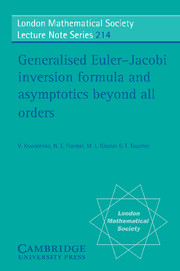Book contents
- Frontmatter
- Preface
- Acknowledgements
- Contents
- 1 Introduction
- 2 Exact Evaluation of Srp/q(a)
- 3 Properties of Sp/q(a)
- 4 Steepest Descent
- 5 Special Cases of Sp/q(a) for p/q < 2
- 6 Integer cases for Sp/q(a) where 2 < p/q < 7
- 7 Asymptotics beyond all Orders
- 8 Numerics for Terminant Sums
- 9 Conclusion
- References
- Tables
- Index
7 - Asymptotics beyond all Orders
Published online by Cambridge University Press: 05 August 2013
Summary
We have already discussed the meaning of ‘asymptotics beyond all orders’ in the Preface and so in this section we shall be concerned primarily with linking this newly emerging area of applied mathematics to the results derived in the previous sections. Although the main thrust of this work has been to develop new and worthwhile inversion formulae, albeit formally, two major questions have arisen naturally concerning the specific meaning of these results. The first of these is:
What does it mean to display all the algebraic terms in an asymptotic expansion before presenting the transcendent ally small exponential terms? In essence, this concerns why we have included all the algebraic terms in our inversion formulae for odd integers of the generalised Euler-Jacobi series when it is known that these series are divergent. The conventional (Poincaré) approach considers only a finite number of leading order terms of an asymptotic expansion and then bounds the remainder (see for example Sec. 4.6 of Ref. [19]). In most cases only a few terms are evaluated, since the remainder is usually relatively small. However, when the aim is to develop an expansion that gets closer to reproducing the original function, the conventional approach is then to find the optimal number of terms before the asymptotic expansion begins to diverge, and to discard the remaining terms in the expansion by replacing them with the bound for this optimal number.
Information
- Type
- Chapter
- Information
- Publisher: Cambridge University PressPrint publication year: 1995
